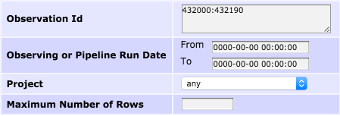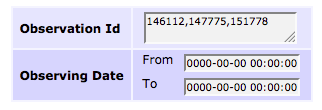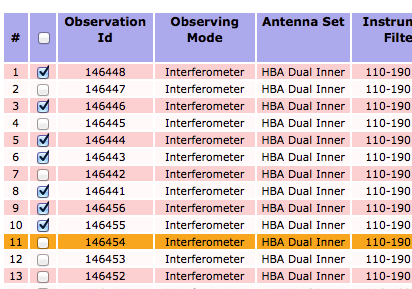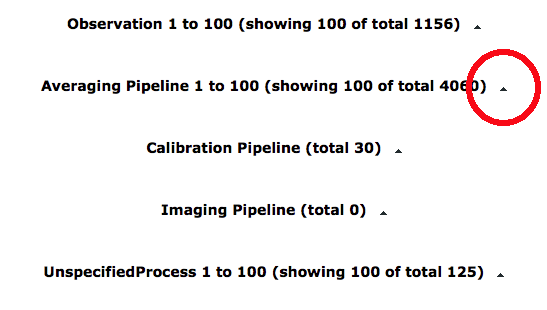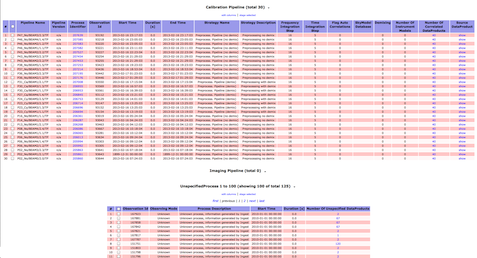This is an old revision of the document!
Advanced ways to find and retrieve data in the LTA
There are some useful ways to find and retrieve your data in the LTA that might not be immediately obvious. This page explains some of the more advanced options you have.
Queries
- You can use colons in numeric queries, to select ranges. This will for example give all observations and pipelines that have a SAS/Observation ID in the range from 432000 to 432190:
In textual entries, wildcards can be used.

- You can put a list of SAS/Observation IDs in the query:
Viewing data
When you are looking at the results of a query you might see something like this:
This means that the observation is known in the LTA, it knows what data was produced, the produced data was not archived, but further processing happened on the raw data and the results of some of those pipelines were archived. If you click on the zero, you will see something like this:
This allows you to navigate from a pipeline back to the original observation, or from the observation to any pipelines that have run on the raw data.
Retrieving data
- You can retrieve data on the Observation and Pipeline level, you don't have to select all files individually.
- If you have a query with more than 1000 results, you can open the multiple pages each in a separate tab/window.
- With the small triangle next to a list, you can fold or unfold the list to get a better overview.
Folded entries
Unfolded entries
DBView
There is a server that gives the option to run your own queries on the database http://lofar-dbview.target.rug.nl/
A useful query might be this one, that gives you all files for a certain Obs Id (SAS VIC tree ID).
SELECT fo.URI, dp."dataProductType", dp."dataProductIdentifier",
dp."processIdentifier"
FROM AWOPER."DataProduct+" dp,
AWOPER.FileObject fo,
AWOPER."Process+" pr
WHERE dp."processIdentifier" = pr."processIdentifier"
AND pr."observationId" = '123456'
AND fo.data_object = dp."object_id"
AND dp."isValid" > 0
In this '123456' should be replaced with the Obs Id of an Observation/Pipeline you're looking for.
AstroWise Python Interface
There is also a python interface to the LTA. With this, you can also script some advanced queries. To have this working, you first need to install the LTA client in your machine. Once you have installed the client, set up your user name and password. These are the same as for MoM. Remember that this is just a different interface to the LTA catalogue: you will need the same credentials as for the web interface.
In your home directory, add the following to the file .awe/Environment.cfg
database_user : <your username> database_password : <your password>
Finally, your hostname may cause an error, if it does not contain a full domain. In this case, check your /etc/hosts file. You should find a line that looks like this
127.0.0.1 localhost
Change that line into
127.0.0.1 localhost <your_host_name>
If you do not know your hostname, just type hostname in a shell and you will get it as an output.
Now, you may still see some warnings, but you can use the following script as a test. If everything works fine, the script will print out all observations in a certain patch of the sky:
# python code
from pprint import pprint
from common.database.Context import context
from awlofar.main.aweimports import Observation, Pointing, SubArrayPointing
result = {}
for project in sorted(context.get_projects()) :
print "Project %(project)s" % vars()
ok = context.set_project(project)
# do your query
obs_ids = set()
query = (Pointing.rightAscension > 95) & \
(Pointing.rightAscension < 105) & \
(Pointing.declination > 20) & \
(Pointing.declination < 30)
print "Total Pointings %d" % len(query)
for pointing in query :
print "Pointing found RA %f DEC %f" % (pointing.rightAscension, pointing.declination)
query_subarr = SubArrayPointing.pointing == pointing
for subarr in query_subarr:
query_obs = Observation.subArrayPointings.contains(subarr)
for obs in query_obs :
obs_ids.add(obs.observationId)
result[project] = sorted(list(obs_ids))
print result[project]
pprint(result)
